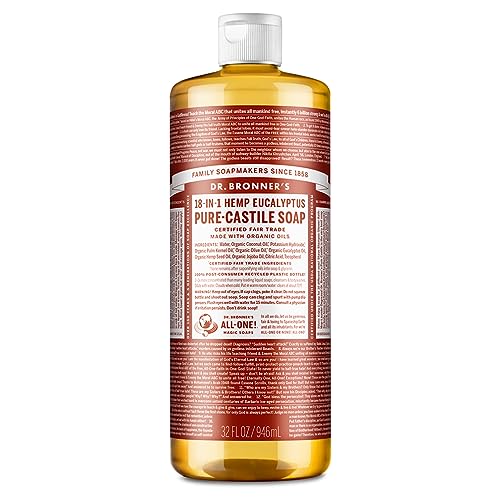
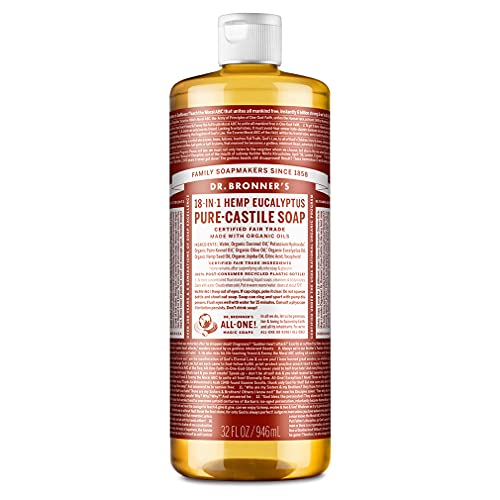
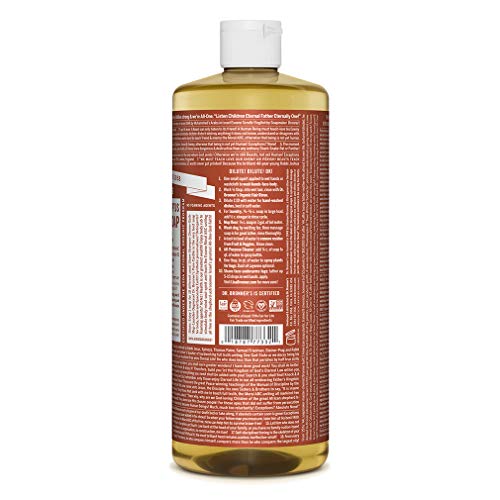
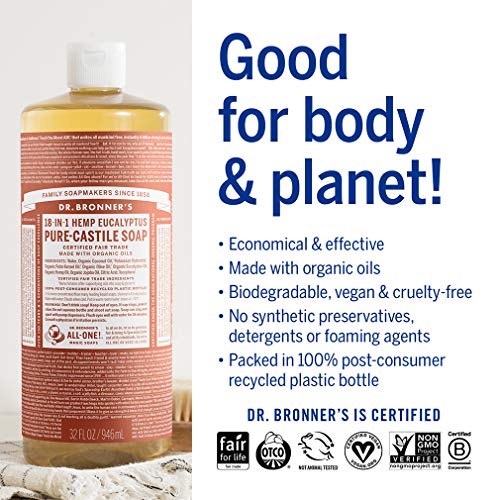
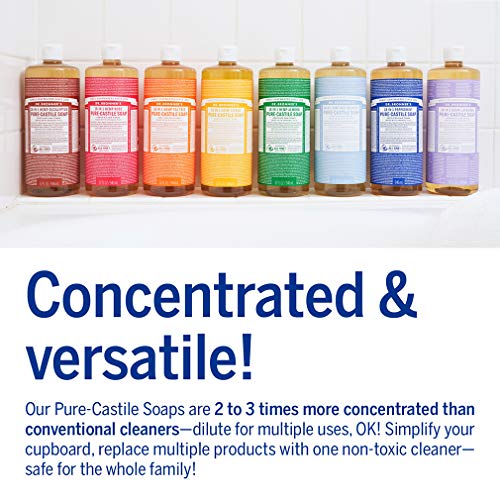
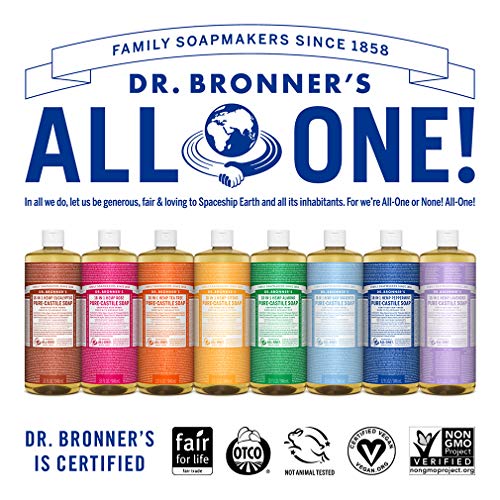
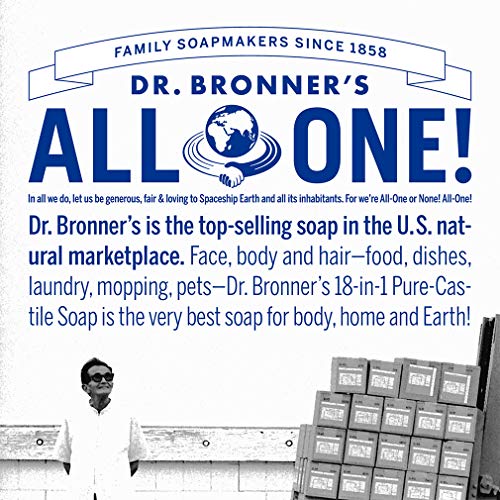
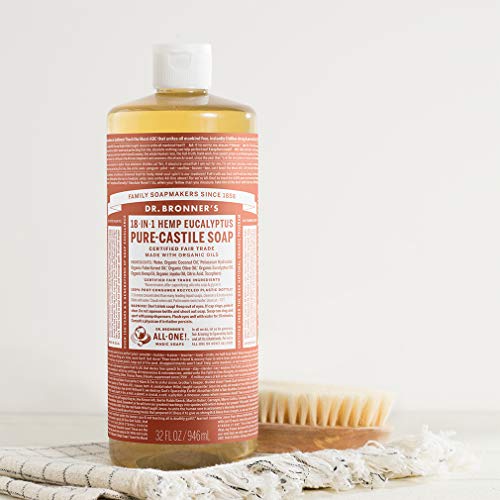
Dr. Bronner's Pure-Castile Liquid Soap - Organic, Fair Trade, Vegan, 18-in-1 Uses - Eucalyptus, 32oz
Citric Acid
Medium RiskCitric acid is an alpha hydroxy acid used in personal care products primarily for its role as a pH adjuster and natural preservative. It occurs naturally in citrus fruits and is commonly utilized in various formulations for its chelating properties and mild exfoliation benefits.
Sustai Insights
Citric acid offers functional benefits as an effective preservative and pH stabilizer, contributing to product longevity and stability. It is biodegradable and derived from renewable sources. Health risks are low, with minimal concerns regarding carcinogenicity, allergies, and reproductive toxicity. However, moderate use restrictions exist due to potential irritation at high concentrations. Environmental risks are limited, as citric acid is not known to accumulate in ecosystems. Regulatory agencies have no significant advisories against its use. Overall, it is assessed as a medium-risk ingredient, with safe usage practices recommended and alternatives available.
Eucalyptus Globulus (Eucalyptus) Leaf Oil
Medium RiskEucalyptus globulus leaf oil is a volatile oil derived from the leaves of the eucalyptus tree, primarily used for its aromatic properties and as a potential antimicrobial agent in various products.
Sustai Insights
Eucalyptus globulus leaf oil offers functional benefits like fragrance and potential antimicrobial properties, supporting product efficacy. However, it presents high allergenic potential and moderate irritation concerns, which may pose health risks. Environmental risks include possible pollution and bioaccumulation. Regulatory restrictions are in place regarding its use in certain products. Overall, the risk level is medium, necessitating caution in usage and consideration of alternatives like tea tree oil or peppermint oil.
Tocopherol, D Alpha
Low RiskTocopherol, specifically d-alpha tocopherol, is a naturally occurring form of Vitamin E. It is commonly used in cosmetic and personal care products primarily for its antioxidant properties, helping to protect formulations from oxidation and extend shelf life.
Sustai Insights
D-alpha tocopherol provides effective antioxidant benefits, contributing to product stability. It is sustainably sourced and generally regarded as safe, with low concerns regarding carcinogenicity, allergies, and reproductive toxicity. However, there are minor concerns about endocrine disruption. Regulatory bodies have not imposed significant restrictions, indicating low overall risk. Recommended usage practices include adhering to established safe concentration thresholds. Alternatives, such as other forms of Vitamin E or plant-based antioxidants, may also be considered.
Simmondsia Chinensis (Jojoba)
Low RiskSimmondsia chinensis, commonly known as jojoba, is an oil derived from the seeds of the jojoba plant. It is commonly used in cosmetic formulations for its moisturizing properties, acting as an emollient and skin conditioning agent.
Sustai Insights
Jojoba oil offers functional benefits such as effective skin moisturization and is biodegradable, with sustainable sourcing practices. Health risks are low, with minimal concerns regarding carcinogenicity, allergies, and reproductive toxicity. Environmental impact is negligible, with no pollutant or bioaccumulation potential. Regulatory status is favorable with no significant restrictions noted. Overall, it is assessed as low risk, and safe usage practices should be maintained. Alternatives include other plant-derived oils like argan or almond oil, which may provide similar benefits.
Water
Low RiskWater is a clear, colorless liquid essential for various biological processes. It serves as a solvent in formulations, facilitating the dissolution of other ingredients and enhancing product texture and application. Additionally, water plays a crucial role in hydration and is a key component in many cosmetic and personal care products.
Sustai Insights
Water is an effective solvent and hydrator, contributing to the texture and efficacy of formulations. It is biodegradable and generally regarded as safe, with low concerns regarding carcinogenicity, allergies, and reproductive toxicity. However, excessive water usage can lead to environmental concerns, particularly regarding resource depletion. Regulatory bodies do not impose restrictions on water use in cosmetics. Overall, the risks associated with water are low, making it a safe and essential ingredient.
Sea Salt
Low RiskSea salt is a mixture of inorganic salts derived primarily from the evaporation of seawater. It consists mainly of sodium chloride, with minor amounts of other minerals. Sea salt is commonly used as a seasoning and preservative in food products and may also have applications in cosmetics and personal care items.
Sustai Insights
Sea salt serves as an effective flavor enhancer and preservative, contributing to the taste and shelf-life of food products. It is generally considered safe with low risk for health concerns such as cancer, allergies, and reproductive toxicity. Environmental impact is minimal, as it does not contribute significantly to pollution or bioaccumulation. Regulatory bodies, including the FDA, currently do not impose restrictions on its use. Overall, the risk level associated with sea salt is low, making it a widely accepted ingredient with no significant adverse effects reported.
Tocopherol, D Alpha
Low RiskTocopherol, specifically d-alpha tocopherol, is a naturally occurring form of Vitamin E. It is commonly used in cosmetic and personal care products primarily for its antioxidant properties, helping to protect formulations from oxidation and extend shelf life.
Sustai Insights
D-alpha tocopherol provides effective antioxidant benefits, contributing to product stability. It is sustainably sourced and generally regarded as safe, with low concerns regarding carcinogenicity, allergies, and reproductive toxicity. However, there are minor concerns about endocrine disruption. Regulatory bodies have not imposed significant restrictions, indicating low overall risk. Recommended usage practices include adhering to established safe concentration thresholds. Alternatives, such as other forms of Vitamin E or plant-based antioxidants, may also be considered.
Citric Acid
Medium RiskCitric acid is an alpha hydroxy acid used in personal care products primarily for its role as a pH adjuster and natural preservative. It occurs naturally in citrus fruits and is commonly utilized in various formulations for its chelating properties and mild exfoliation benefits.
Sustai Insights
Citric acid offers functional benefits as an effective preservative and pH stabilizer, contributing to product longevity and stability. It is biodegradable and derived from renewable sources. Health risks are low, with minimal concerns regarding carcinogenicity, allergies, and reproductive toxicity. However, moderate use restrictions exist due to potential irritation at high concentrations. Environmental risks are limited, as citric acid is not known to accumulate in ecosystems. Regulatory agencies have no significant advisories against its use. Overall, it is assessed as a medium-risk ingredient, with safe usage practices recommended and alternatives available.
Simmondsia Chinensis (Jojoba)
Low RiskSimmondsia chinensis, commonly known as jojoba, is an oil derived from the seeds of the jojoba plant. It is commonly used in cosmetic formulations for its moisturizing properties, acting as an emollient and skin conditioning agent.
Sustai Insights
Jojoba oil offers functional benefits such as effective skin moisturization and is biodegradable, with sustainable sourcing practices. Health risks are low, with minimal concerns regarding carcinogenicity, allergies, and reproductive toxicity. Environmental impact is negligible, with no pollutant or bioaccumulation potential. Regulatory status is favorable with no significant restrictions noted. Overall, it is assessed as low risk, and safe usage practices should be maintained. Alternatives include other plant-derived oils like argan or almond oil, which may provide similar benefits.
Eucalyptus Globulus (Eucalyptus) Leaf Oil
Medium RiskEucalyptus globulus leaf oil is a volatile oil derived from the leaves of the eucalyptus tree, primarily used for its aromatic properties and as a potential antimicrobial agent in various products.
Sustai Insights
Eucalyptus globulus leaf oil offers functional benefits like fragrance and potential antimicrobial properties, supporting product efficacy. However, it presents high allergenic potential and moderate irritation concerns, which may pose health risks. Environmental risks include possible pollution and bioaccumulation. Regulatory restrictions are in place regarding its use in certain products. Overall, the risk level is medium, necessitating caution in usage and consideration of alternatives like tea tree oil or peppermint oil.
Water
Low RiskWater is a clear, colorless liquid essential for various biological processes. It serves as a solvent in formulations, facilitating the dissolution of other ingredients and enhancing product texture and application. Additionally, water plays a crucial role in hydration and is a key component in many cosmetic and personal care products.
Sustai Insights
Water is an effective solvent and hydrator, contributing to the texture and efficacy of formulations. It is biodegradable and generally regarded as safe, with low concerns regarding carcinogenicity, allergies, and reproductive toxicity. However, excessive water usage can lead to environmental concerns, particularly regarding resource depletion. Regulatory bodies do not impose restrictions on water use in cosmetics. Overall, the risks associated with water are low, making it a safe and essential ingredient.
Sea Salt
Low RiskSea salt is a mixture of inorganic salts derived primarily from the evaporation of seawater. It consists mainly of sodium chloride, with minor amounts of other minerals. Sea salt is commonly used as a seasoning and preservative in food products and may also have applications in cosmetics and personal care items.
Sustai Insights
Sea salt serves as an effective flavor enhancer and preservative, contributing to the taste and shelf-life of food products. It is generally considered safe with low risk for health concerns such as cancer, allergies, and reproductive toxicity. Environmental impact is minimal, as it does not contribute significantly to pollution or bioaccumulation. Regulatory bodies, including the FDA, currently do not impose restrictions on its use. Overall, the risk level associated with sea salt is low, making it a widely accepted ingredient with no significant adverse effects reported.
Experience the refreshing and versatile Dr. Bronner's Pure-Castile Liquid Soap in Eucalyptus. Made with over 70% organic and fair-trade ingredients, this soap not only cleans but also supports ethical practices and sustainable communities.
- Organic & Fair Trade Ingredients: Crafted with ethically sourced palm kernel oil from Ecuador, promoting fair wages and sustainable farming.
- Versatile Uses: This concentrated formula offers 18-in-1 uses, perfect for everything from body care to laundry, reducing the need for multiple products.
- Gentle on Skin: Free from synthetic preservatives and detergents, it's made with plant-based ingredients that are safe for the environment and kind to your skin.
- Eco-Friendly Packaging: Packaged in 100% post-consumer recycled plastic, contributing to waste reduction and a cleaner planet.
- Value for Money: With three times the concentration of typical liquid soaps, a little goes a long way, ensuring durability and cost-effectiveness while minimizing waste.
Subscribe & Save with Sustai
- Best Price Guarantee: Always enjoy the lowest prices on sustainable home essentials.
- No Surprises: We’ll notify you before shipping. No hidden fees, ever.
- You’re in Charge: Change, pause, or cancel your subscription anytime with ease.
- Eco-Friendly Deliveries: Our grouped shipments mean less packaging and lower emissions.
Join us on a sustainable journey. Special offers for a limited time! Prices and promotions may change.
Recommended Products
Experience the refreshing and versatile Dr. Bronner's Pure-Castile Liquid Soap in Eucalyptus. Made with over 70% organic and fair-trade ingredients, this soap not only cleans but also supports ethical practices and sustainable communities.
- Organic & Fair Trade Ingredients: Crafted with ethically sourced palm kernel oil from Ecuador, promoting fair wages and sustainable farming.
- Versatile Uses: This concentrated formula offers 18-in-1 uses, perfect for everything from body care to laundry, reducing the need for multiple products.
- Gentle on Skin: Free from synthetic preservatives and detergents, it's made with plant-based ingredients that are safe for the environment and kind to your skin.
- Eco-Friendly Packaging: Packaged in 100% post-consumer recycled plastic, contributing to waste reduction and a cleaner planet.
- Value for Money: With three times the concentration of typical liquid soaps, a little goes a long way, ensuring durability and cost-effectiveness while minimizing waste.

You can have at most 2 Sustainable Steals products in your cart
Customer Reviews
Customers’ View
Customers appreciate the effectiveness and eco-friendly attributes of the Body Soap with Eucalyptus. Many users commend its pleasant scent, describing it as 'wonderful' and 'not overwhelming,' with one noting it helps them feel hydrated post-use. The soap's quality is frequently highlighted, with customers noting its versatility for various cleaning tasks, from personal care to household uses. While the product is praised for its ability to clean effectively, opinions on skin dryness vary; some find it gentle and non-drying for sensitive skin, while others report it can be drying. Additionally, consumers recognize its value for money, particularly due to its concentrated formula, which means a little goes a long way. Overall, this product aligns well with sustainable and health-conscious values, making it a reliable choice for environmentally minded consumers.
AI-generated from the text of customer reviewsThis product is rated 4.8 of 5.0 stars.
It has received 29 reviews.




